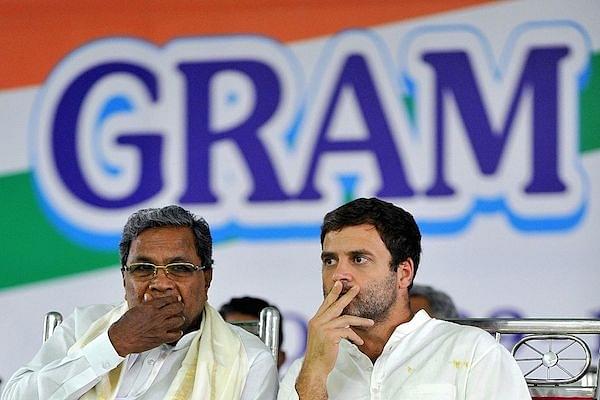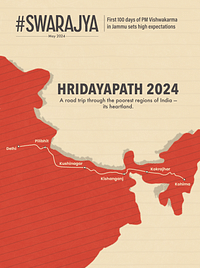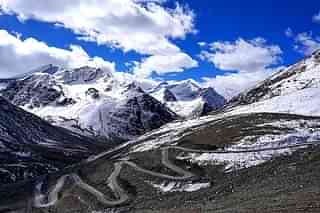Karnataka
Review Of The Beginning: The First 100 Days Of Congress Government In Karnataka
Sharan Setty
Aug 31, 2023, 12:57 PM | Updated 01:20 PM IST
Save & read from anywhere!
Bookmark stories for easy access on any device or the Swarajya app.

On 29 August, during the launch of the latest welfare scheme, 'Gruha Lakshmi', Congress leader Rahul Gandhi remarked that the party's 'Karnataka model' will be replicated all across the country, should the Congress return to power at the Centre.
It has been over a hundred days since Siddaramaiah took oath as chief minister of Karnataka, for a second time. That gives us an appropriate occasion to review what this Karnataka model is and what impact has it had on the governance, economy and the people of Karnataka.
Freebies In, Infra Out
The 'revdi' fever has gripped Karnataka. In fact, it can be argued that this is where it all began.
In the run-up to the polls earlier this year, the Congress made a few big-ticket announcements.
Among these were five promises:
1. 'Gruha Lakshmi' — a scheme that offers a monthly cash dole of Rs 2,000 to every woman head of a BPL family;
2. 'Yuva Nidhi' scheme, which provides an allowance of Rs 1,500 and Rs 3,000 per month to every diploma holder and graduates in the state, respectively;
3. 'Gruha Jyoti' which provides 200 units of power for free to all homes in the state;
4. 'Shakti' scheme which offers free bus travel for women across the state; and finally,
5. 'Anna Bhagya' — 10 kilograms of free rice to BPL families.
While a few schemes are currently up and running, the rest will be implemented soon, the Congress has said.
The issues with the implementation of these schemes are as follows:
First, the implementation of major infrastructure projects in the state has taken a backseat.
Government contractors have threatened to halt work since their bills are yet to be cleared. Karnataka's deputy Chief Minister (DyCM) D K Shivakumar, in a candid admission, stated that the funds for development work cannot be provided in the first year, since the welfare schemes require a huge budget to be pulled off.
Second, a conservative estimate of the cost of these schemes is adding up to a whopping amount — anywhere between Rs 40,000 to Rs 60,000 crore.
This will result in the fiscal deficit doubling to nearly Rs 1,25,000 crore, experts say. Breaching the upper cap of three per cent (of overall GSDP) fiscal deficit harms the overall health of the economy, and distracts the government from focusing on employment generation.
Third, corruption tends to follow as a byproduct of such implementation of welfare schemes. In a press conference held on 29 August, former Chief Minister Basavaraj Bommai has stated that the police postings are being 'auctioned' in the state.
At times like these, governments tend to worry more about the sale of alcohol, for revenue generation, than about the number of jobs they are able to create.
Dr Nanda Kishor, an associate professor at the Department of Politics and International Studies, Pondicherry University, states that these events may potentially lead to the erosion of a mature political culture the state is known for.
"As a result of the voters' unprecedented rush to get freebies, the discourse of development has gone missing. A voter who was a potential contributor to the growth mechanism is today a consumer. It sets a negative trend from a human resource perspective", he says.
He says that the cracks are already visible with the rising electricity prices and the cost that comes with implementing freebies.
"This can stunt the state's progress phenomenally. What is more disappointing is that this is coming from a political leader like Siddaramaiah who has presented so many budgets. He surely knows what this will do to the state of Karnataka", he adds, iterating his fears.
Super Chief Ministers?
The Lutyens' equivalent of Bengaluru is arguably in and around central Bengaluru.
Press Club of Bangalore, the dining area at KPCC on Queen's Road are places where one can consume two things at once — latest political gossip and a sumptuous meal.
Congressmen in Karnataka, have seen to be adept at managing the media. A glance at the recent statements issued by senior Congress leaders makes one thing clear — the few ordained ministers have the 'freehand' to constantly comment on ongoing issues.
These leaders range from former KPCC chief Dinesh Gundu Rao to IT minister Priyank Kharge.
The buzz in town is that Kharge has been given a 'freehand' to comment on ongoing issues and keep the rhetoric up.
When the conflict between between Siddaramaiah and D K Shivakumar had escalated, it was the senior Kharge who brought order to the house. Shivakumar had to compromise and settle for the best available offer — the deputy chief minister's post and portfolios like Bengaluru development.
Since then, there have been many ministers who are attempting to dominate the discourse in the state.
Quick delivery on 'core' issues
Prior to the formation of the government, several Congress leaders stated that a ban on Bajrang Dal will be implemented once they come to power.
Since coming to power, Congress leaders have spoken about scrapping laws like the anti-cow slaughter law (Prevention of Slaughter and Preservation of Cattle Act, 2020), National Education Policy (NEP) and revoked the amendments made to the APMC Act.
Soon enough, the new government decided to withhold the funding to state run temples before eventually withdrawing the circular.
Taking to the media, Nalin Kumar Kateel, the state BJP president in Karnataka stated that the Congress has enabled an 'Emergency-like environment' in the state where activists are being persecuted for speaking their minds.
Swarajya's report had earlier mentioned how the 'anti-communal' wing of the Karnataka Police in Mangaluru is imposing 'exile' on Hindu activists who are considered to be a threat to communal harmony.
Law And Order Problems
Media reports suggests that incidents of masked criminals threatening unsuspecting motorists on the roads, after a pretend-accident caused by them, are increasing in Karnataka, especially Bengaluru.
Recently, a scientist shared his frightening tale of how such criminal elements smashed his windowpane in the middle of the night. Goons chased the scientist's car, threatened him by brandishing swords and left after vandalising his car.
These incidents were unheard of, in a city like Bengaluru.
News reports indicate that several gangsters have also resurfaced in the city.
Apart from the above, reports of robberies on highways in Karnataka are also on the rise. The newly constructed Bengaluru-Mysuru expressway is witnessing robberies. Since March 2023, more than ten such incidents have been reported near Mandya alone.
The gruesome murder of a Jain monk in Belagavi and the recent arrests of suspected sleeper cell terrorists marks the beginning of a new set of concern for the city and the state.
A partial test of the government's popularity will come with the Lok Sabha elections of 2024. Unless a course correction is effected, Karnataka may see a result like that of 2019, when the Congress was ousted from power.
Save & read from anywhere!
Bookmark stories for easy access on any device or the Swarajya app.
Sharan Setty (Sharan K A) is an Associate Editor at Swarajya. He tweets at @sharansetty2.
Support Swarajya's 50 Ground Reports Project & Sponsor A Story
Every general election Swarajya does a 50 ground reports project.
Aimed only at serious readers and those who appreciate the nuances of political undercurrents, the project provides a sense of India's electoral landscape. As you know, these reports are produced after considerable investment of travel, time and effort on the ground.
This time too we've kicked off the project in style and have covered over 30 constituencies already. If you're someone who appreciates such work and have enjoyed our coverage please consider sponsoring a ground report for just Rs 2999 to Rs 19,999 - it goes a long way in helping us produce more quality reportage.
You can also back this project by becoming a subscriber for as little as Rs 999 - so do click on this links and choose a plan that suits you and back us.
Click below to contribute.





